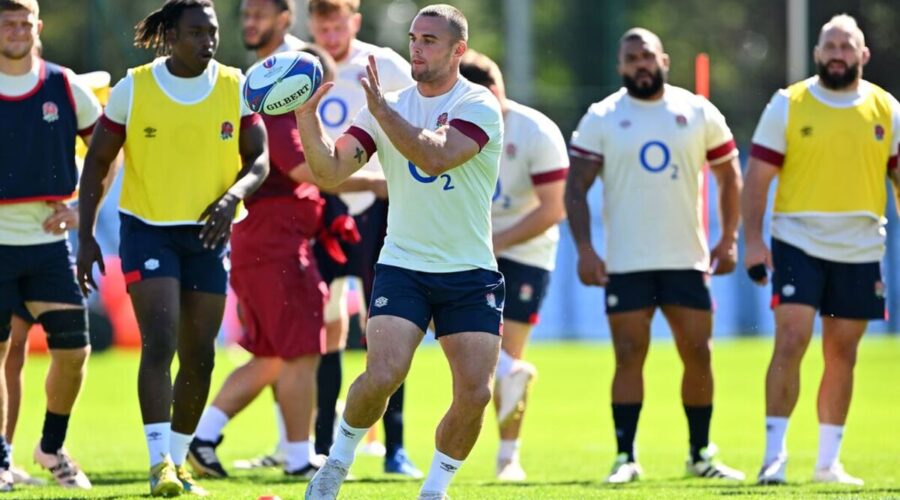Dark shadow cast over Rugby World Cup with call for England star to miss event
The finishing touches are being applied to rugby union’s grandest stage. Tomorrow the Rugby World Cup jamboree will kick-off in Paris and across the 20 competing nations the tingle of anticipation is growing. Alix Popham, who played in the 2003 and 2007 editions for Wales, shares the buzz – up to a point.
Rugby is, after all, the game that gave him everything and the game which, with his early-onset dementia diagnosis, will take everything away too. “I still love the game but it’s a mixture of emotions. I watch rugby now through different eyes knowing what I know with regards to every impact,” he said.
The collisions and impacts are part of the thrill ride for players and fans. There will no doubt be a big hits highlights reel compiled from France ‘23. But the consequences of those impacts and just as significantly the countless smaller ones a player accumulates over a career is rugby’s dark shadow. Concussion is the spectre at the feast.
“I don’t like using the word concussion,” says Popham. “It softens what has actually gone on – which is a traumatic brain injury.”
Rugby, by its nature, attracts them but since his diagnosis in 2020, Popham has made it his mission to ensure those who run rugby deliver on their responsibility to the players and make an inherently unsafe game as safe as possible.
The sport has wised up since the wild west days of early professionalism. There are now guidelines from World Rugby restricting contact training to just 15 minutes per week. Importantly, though these are just guidelines.
“The NFL brought this in 14 years ago and it is policed properly. Teams are fined if they go over that limit,” said Popham. “There are some teams that are doing an amazing job and are very strict on it but some teams aren’t….”
Rugby, he feels, even with the class action lawsuit against the game’s governing bodies which he is part of, has not quite got the message. He was highly critical when Owen Farrell initially escaped punishment for his high tackle in the World Cup game against Wales. Even now, he does not think the subsequent four-week ban that will enable the England captain to rejoin the side midway through the group stage is sufficient.
“For Owen Farrell to only get a four-game ban with his history…I like him as a player and as a competitor but he hasn’t learned from his previous bans,” said Popham. “Kids are watching that with their mums and dads thinking: ‘well if he can get away with it so can I’ so it’s not a good look for rugby as a whole.”
He would like to see six-month bans for repeat offenders, 28-day mandatory stand-downs for knocked-out players and a new approach to substitutions.
We use your sign-up to provide content in ways you’ve consented to and to improve our understanding of you. This may include adverts from us and 3rd parties based on our understanding. You can unsubscribe at any time. More info
“South Africa bring on seven huge mutants against tired players during games,” he said. “I’m not having a go at South Africa – they are just playing within the rules – but I think substitutions should only be for injuries.”
Popham’s Head For Change charity is aiming to roll out an education programme for schools and grassroots clubs to improve awareness.
To help fund it, he is cycling from London to Lyon to watch Wales’s World Cup game with Australia in a peloton which will be led by Tour de France winner Geraint Thomas.
“He’ll be just coming off the Vuelta but we’ll make sure he does his turn up the front,” he said.
It is one of a series of fund-raising challenges he is undertaking including a cross-code relay Channel swim in October although the first, an Ironman in Tenby at the weekend, had to be cut short when he was concussed during the swim and briefly ended up in hospital.
“It was a freak accident. I’m still a little hazy but I’m on the mend. I’ll make sure I stay out of the way of the experts next time,” he said. “It’s good for me to have a goal, something to train for and to give me a positive mindset. Exercise and blood flow to the brain helps everybody.”
There are plenty within rugby who would still prefer to let the players take their chances in the rough and tumble as they have always done, to leave well alone. But Popham is not having that. And why should he?
“I just know when I look in the mirror what I’m doing is the right thing. I’m speaking the truth to make it safer. Once we are honest with each other we can move forward and enjoy what is an amazing game together.”
Blob To support the Head For Lyon charity bike ride head to https://justgiving.com/campaign/headforlyon.
Source: Read Full Article


